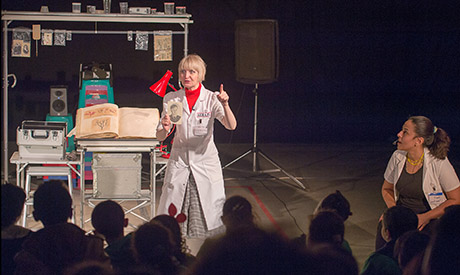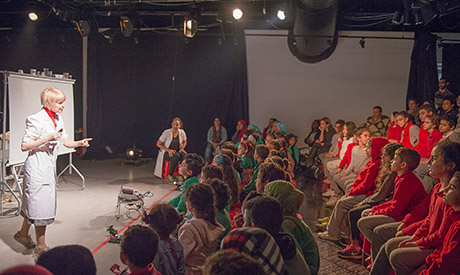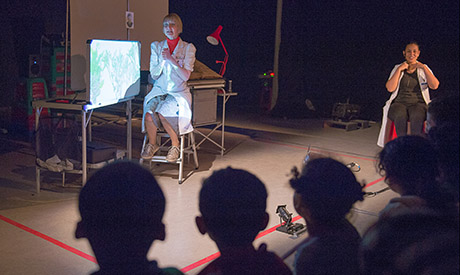The seventh edition of the Hakawy International Arts Festival for Children (7-16 March) brought plays and creative activities from Egypt, Germany, the UK and the USA. As is the case each year, while the plays gave the young audience a lot of fun, they also opened their eyes to many issues, triggering thoughts and igniting the imagination. Each play offered something wonderful and unique in its own way, and The Curious Scrapbook of Josephine Bean from the UK was no exception.
The award-winning performance was created in 2011 by Shona Reppe, who is also the only actress on stage. Reppe was born to an English mother and a Norwegian father, and she lives close to Edinburgh, Scotland. Though her family had no artists in it, she developed a passion for theatre, particularly children’s theatre.
Reppe studied theatre, history of art and English at Glasgow University (1991), earning a postgraduate diploma in stage design at the Welsh College of Drama in Cardiff (1992) and doing summer studies at the London School of Puppetry. In 1996, she founded Shona Reppe Puppets, now known simply as Shona Reppe. The artist’s online biography goes on to enumerate the many shows she has created, most of them – including this one – based on her own original stories.
“My educational background lies in theatre design and I started off as a puppeteer. Through the years as I began creating my own world, I started using the puppets less, relying on a character more. I like to be on a stage, yet I often take elements of the puppetry with me. I am also interested in an object and stories around objects,” she explains.
As the play’s title indicates, the scrapbook is the main object and a protagonist in its own right. The scrapbook is also a nucleus of extremely imaginative developments. Researcher and “scrapologist” Dr Patricia Baker (Shona Reppe), founder of the Society for the Care, Repair and Analytical Probing of Scrapbooks (abbreviated as SCRAPS) is on a quest to uncover the story behind the scrapbook on her desk, something she does in front of the young audience whom she refers to as “scrapets”.
And since a scrapbook can be a very straightforward and flat object for theatre – “a kiss of death”, as Reppe puts it – she had to find a formula that would help her infuse the episodic experience of turning the book’s pages into a vibrant and thought-provoking performance. To do so, the technical side of the story is as impressive as it is complicated.
Reppe reveals that the performance’s technical manager, Tamlin Wiltshire, used QLab software to make rapid shifts between the many elements of the show: moving across the soundscape, short animations that reflect Dr. Baker’s study of tiny objects emerging from the scrapbook, lighting that includes the theatre projectors and a table lamp, and even elements of shadow theatre in one scene and a short movie in the final scene.
On the investigation table lies a scrapbook, a big, outstanding prop whose magnificence creates is in contrast with the rest of the simple -- and obviously easy to transport -- scenography representing the laboratory.
“I have always been interested in scrapbooks; there is a big culture of scrapbooks particularly in the USA and UK. All the elements that we find in any scrapbook are close to the person who collected them, they all tell his or her unique story.” In this story, we learn that the scrapbook’s owner, Artemis J Mood, is an old man from the Victorian era. The fact that he was a watchmaker was probably behind his particular interest in small things and ability to spot them.

The Curious Scrapbook of Josephine Bean performed in Cairo, March 2017 (Photo: Bassam Al Zoghby)
Dr. Baker’s investigation also unveils that Artemis traveled a lot to the sea where he collected different kind of seaweeds that he dried and kept in the scrapbook; he smoked a pipe, enjoyed ballet and good food. Not without significance is Artemis’s special heart-shaped sea bean, Fava de Colom or a Columbus Bean, known to bring luck to its owner, or one that can become a foundation for the fantastical developments we find in the play.
Most importantly, however, as Dr. Baker keeps turning the scrapbook’s pages, she discovers that Artemis was in love with a very special, somehow magical woman, Josephine Bean. Revealing more details about Miss Bean would be a huge spoiler so let us stop here.
In the theatre, Dr. Baker walks the audience through her consecutive discoveries. “Making this show was quite complicated,” Reppe says. “I wanted to be able to lay down some clues without giving too much away. It was a challenge to perform it the way that children would not lose interest. This is why it is mainly for children aged seven and above; they have to be able to remember different elements, connect facts and discoveries. It is like a detective story. When I was writing the script, it was like writing a crime novel. In fact, as I was collecting bits and pieces for the show, I also created my own scrapbook for the show. This helped me create this specific scrapbook that you see on stage,” Reppe explains with her hallmark enthusiasm, the same one she projects as Dr. Baker.
The Curious Scrapbook of Josephine Bean delivers many values besides being fun, visually stimulating and aesthetically pleasing. It ignites the imagination and invites children to think. In her investigation, children are not reduced to spectators, they are the “scrapets” whom Dr. Baker expects to be active participants and follow her path of thought. Throughout the show, Dr. Baker repeatedly addresses the audience, explains her scientific procedure of “scrapology” but also awaits the scrapets’ ideas. “It was a bit of a challenge in Cairo since English is not the native language of the audience. In the UK, I can talk more and go deeper into Artemis, Josephine as well as Dr. Baker’s characters. In Cairo, we had to have a translator.” However, in order to avoid a dry translation that would only kill the show, Reppe introduced Dr. Baker’s assistant: Isra Ghazali, an Egyptian actress seated on the stage.
While translating the text, Isra also asked Dr. Baker and the young audience questions, raised her eyebrows at some discoveries and rejoiced in others. “I could see the children were very involved. At times they talked in the audience, which I don’t mind, as long as they talk about the performance, which as Isra told me was the case. If my audience talks about something else, this is when I feel I failed to attract them,” Reppe says. Yet with her skills, experience, creativity and captivating disposition on stage, it is no surprise that she kept the audience focused.
Among the elements that contribute to the great success of the story is Reppe’s approach to children as equal partners on the journey of discovery. The actress and the children think together, while the intimate setting (a maximum of 100 viewers) helps to develop close contact with the children. “I prefer this kind of setting; it allows me to see everyone. There is a contract between me and children. I’m here and we have a good time but we have to work together. This way children understand that they also have a responsibility,” Reppe explains, adding that the shows for children she likes the most are those that are set within intimate settings, created for a smaller audience.

The Curious Scrapbook of Josephine Bean performed in Cairo, March 2017 (Photo: Bassam Al Zoghby)
The intimate setting helps Reppe develop closeness and build trust with the audience, something that is not necessarily a standard procedure in theatre for children.
There are many theatre-makers who create barriers simply because they do not trust the children’s abilities to absorb information and emotions. Because they often address children with an abnormal tonality, unnatural sentences, their performances are filled with preaching and direct instructive educational elements (as they believe), among many other procedures that render the children’s plays awkward for the adult viewer. There are performances that attract the audience with their big Hollywood-style elements, loud and vibrant, definitely enjoyable in their own way, even if they don’t create a strong and intimate bond with the audience. There are also theatre-makers and audiences who judge their success based on the children’s laughter during the show.
Reppe believes that aiming for the show to be funny “is the trap that some performers fall into. Children are very generous, they want to have a good time and they want to laugh. But it is also important to challenge them, to make them think. They do not have to laugh all the time; they need to concentrate as well. The fact that children do not laugh during some segments of the play does not mean that they are not enjoying it.”
The Curious Scrapbook of Josephine Bean provides a whole range of emotional experience for children. There is time for reflection, for questions and curiosity, time for attentive listening and time for laughter, since the story does include numerous funny moments too. It is the artistic voyage through a story which, just like any life story, includes all shades and colours of emotions and actions.
It is not easy to create this captivating equation, this balance between being engaging, moving and yet very human and as a result creating an inspiring work. Skill, experience, knowledge, creativity and intelligence are factors that allow any artist to make a good performance for an audience of children. However, what makes this performance truly great is that those factors are coupled by Reppe’s perfectionism, her honest passion for theatre and her boundless respect for children who, as she says, are “people who only happen to be younger. They understand love, pain, sadness, anger, and all other emotions. You should only be careful how you present those emotions as you do not want to frighten or upset your audience of children. Children are very clever. In the performances I like to give them space, create gaps around the information so they can work things out for themselves. I never tell them directly what to do. If you keep instructing the children, they shut off.”
This does not mean that Reppe aims for education through theatre, however. “This is not my primary goal and it’s not about training the audience. But if you want to find educational values, you will probably find them in my plays. My primary goal is always in the performance’s standard. It has to be as high as I can make it.” Reppe believes that children deserve good theatre and is saddened that many artists and artistic institutions consider theatre for children a lesser form.
“Good theatre for children is essential,” she comments, pointing to the Hakawy International Arts Festival for Children as an important platform for such practices. She also commends Mohamed El Ghawy, the festival’s founder and artistic director, for having the ability to link the many experiences he acquired by traveling around the world and attending plays and festivals for children with the understanding of the needs of young Egyptians. “The world is getting smaller but there are still many gaps and many things children around the world must see. We can fill those gaps. I am also taking a piece of Cairo with me back to the UK. This is such a fascinating city, very vibrant. I can see many stories that are hidden here, many inspirations.”

The Curious Scrapbook of Josephine Bean performed in Cairo, March 2017 (Photo: Bassam Al Zoghby)
This article was first published in Al Ahram Weekly
For more arts and culture news and updates, follow Ahram Online Arts and Culture on Twitter at @AhramOnlineArts and on Facebook at Ahram Online: Arts & Culture
Short link: